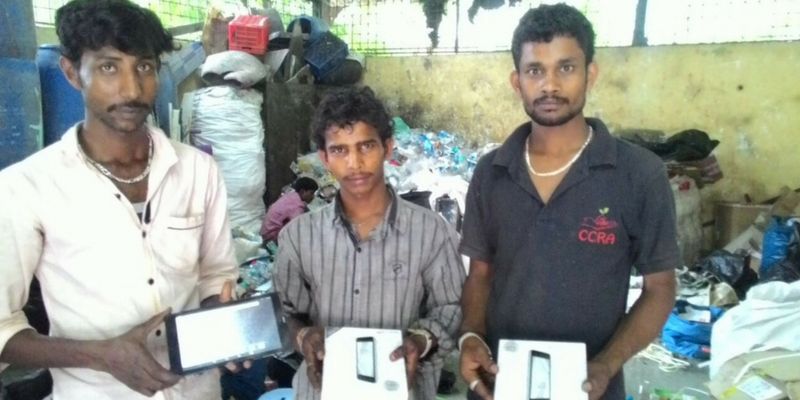University of Commons aims at creating a vibrant, inclusive India through social fiction
Using community-driven technology, the University of Commons platform bridges the efforts of governments, social enterprises, and citizens.
With each passing day, individuals and government look forward to building a ‘new’ India, with vikaas or development as the key focus. And development is popularly measured in terms of either high rise buildings, wider roads or better employment opportunity, and the presence of MNCs in metropolitan cities. However, many issues plague this development model.
Often, the onus of governance falls solely on the government, thereby leading to a disparity between public expectations and work being done on ground by the government municipal bodies. Hence, to bridge this growing divide Satyam Gambhir co-founded University of Commons, a technology-driven community development initiative that empowers residents to nurture a vibrant, diverse and inclusive neighbourhood.

Community-driven change is the future
The blueprint for the future often encourages concrete buildings while placing a high emphasis on the individual needs, and fulfilling demands and aspirations of one's immediate family. The demand for inclusive neighbourhoods is not only overlooked, but it is also one of the reasons for the way our society is fragmented today.
While citizens demand better governance in the domain of waste management, lake development or rainwater harvesting among many others from the government, Satyam believes nothing is possible without community participation and volunteerism.

Through the medium of mobile-based application, University of Commons aims to bring the four stakeholders—volunteers, social entrepreneurs, youth and engineers—together to envision their ideal neighbourhood. In turn, this diverse community will become a force for change and will enable to a build a more inclusive society.
In this connected Facebook world, individuals are disconnected with the fellow neighbourhoods and the ecosystem that works for their betterment. Be it a ragpicker, vegetable vendor or an organic farmer, the city lifestyle offers limited dialogue between these community workers and the residents. And 30-year-old Satyam says that this disengagement is one of the key contributors to misgovernance.
Earlier, in 2013, Satyam’s team started the 'I Got Garbage' initiative, which enabled mobilised individuals to not only participate in extensive waste segregation practices but also empowered communities to come together and work with ragpickers directly. This initiative facilitated a dialogue between the two spectrums of society that resulted in better waste management and helped ragpickers become more economically-empowered and lead a dignified life as a recycle manager.
“We saw that if citizens come together— whether it is about waste management or doing a walkathon to create an awareness, or coming together to say 'no' to steel bridge campaign— unless there is some great citizen movement happening there is very little that we can achieve,” Satyam says.

The community engagement and the energy present among volunteers to work to build a better city got Satyam’s team thinking, and this was the beginning of the ideal neighbourhood conversation. Over the next two-and-a-half years the team conducted several round-table discussions with various volunteer groups, social entrepreneurs and engineers who could codify urban technology.
And University of Commons is an outcome of this idea, where people in every shape and form with varying commitment levels can contribute to build an ideal neighbourhood according to their vision through a service learning programme.
Fiction is the key to unlock future innovations
One of the key features that makes University of Commons unique is its investment in stories and the belief that social fiction is the real driver for future change. Fiction became reality because somebody thought about them and made it a reality later. The Department of Stories is about engaging young children and students to ponder on how future societies would look.
“Can they imagine something that we haven't, and if they have something in mind then it's our duty to make it happen. This is not an investment we are doing in expect of some return. This is a debt we have to pay because we have done enough harm. Let's start undoing it,” he says.

Through various departments, University of Commons offers service learning programmes that suit the needs of volunteers based on their varying commitment levels. The focus is on small internships of 3-6 months, and fellowship of 1-2 years on agriculture, waste, community engagement, creative manufacturing, education, skilling, social entrepreneurship and climate change.
“If you want to learn sales and marketing buddy up with a ragpicker; if you want to learn production processes, go live with a farmer for a year, do a fellowship with us; or if you want to change the education system, then you go teach in schools for a few years and then tell us how to do it,” Satyam explains, adding, “Basically, you get to implement your ideas with us, when you are a protege with University of Commons.”
A connected, inclusive India is the dream
The University Commons aims to expand its base not just in Bengaluru, but also in Tier I and II cities and towns across India. The focus of this technology-driven initiative is 'to arrive at a recipe of good neighbourhood,' which can be customised according to the needs of a community, based on the available facilities specific to a particular locality.

The university does not claim to be a one-stop solution to every problem. Rather, functioning as a crowdsourcing solution, it acts as a platform where individuals get access to all partners, social entrepreneurs, and key drivers of the society, who will together make the neighbourhood more sustainable and inclusive.
“This looks like star-gazing, like something unachievable. But we said let's give it a try because if we don't start today and start tomorrow, it will take one extra day to finish it,” says Satyam.






